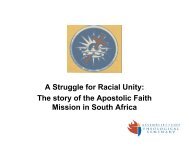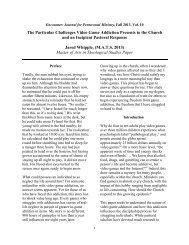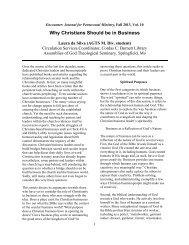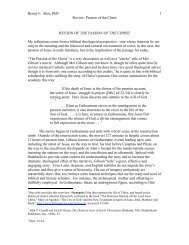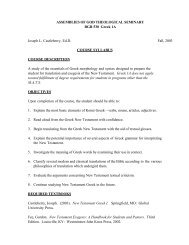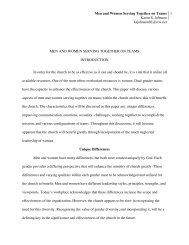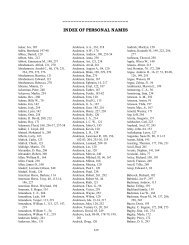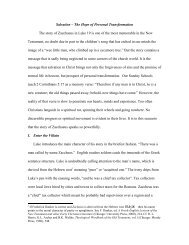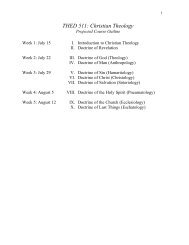Encounter: Journal for Pentecostal Ministry - Assemblies of God ...
Encounter: Journal for Pentecostal Ministry - Assemblies of God ...
Encounter: Journal for Pentecostal Ministry - Assemblies of God ...
Create successful ePaper yourself
Turn your PDF publications into a flip-book with our unique Google optimized e-Paper software.
The evidence <strong>of</strong> research supports the view<br />
that Luke does in fact possess a consistent<br />
theology regarding the poor in both his<br />
Gospel and in Acts based on the teachings <strong>of</strong><br />
Christ. A solution regarding the effect<br />
Lukan theology to the poor has on moral<br />
obligations <strong>for</strong> the Church will be provided.<br />
Based on this evidence, this seminar paper<br />
includes the presentation <strong>of</strong> an historical and<br />
exegetical overview <strong>of</strong> Luke‟s economic<br />
theology and practical application <strong>for</strong> the<br />
universal Church‟s current state in the<br />
modern world as it relates to the poor. This<br />
in<strong>for</strong>mation will also include an overview <strong>of</strong><br />
the economic and financial obligations <strong>of</strong><br />
the individual believer.<br />
Inductive Literary and Exegetical<br />
Analysis<br />
The Identity <strong>of</strong> the Poor<br />
When discussing a biblical theology to the<br />
poor, it is essential that one understand who<br />
exactly the poor were and the conditions <strong>of</strong><br />
the ones to whom Luke was writing or<br />
speaking in his works. In order to<br />
understand Lukan theology regarding the<br />
poor, one must be aware <strong>of</strong> the Old<br />
Testament idea <strong>of</strong> the poor in Israel<br />
according to <strong>God</strong>‟s commands. Jesus was,<br />
after all, a Jew, and the Scripture He used<br />
was the Old Testament. Although poverty<br />
was <strong>of</strong>ten identified in the Old Testament as<br />
a result <strong>of</strong> sin (Prov. 10:4; 13:18; 21:17;<br />
24:30-34; 19:15), the concept is most <strong>of</strong>ten<br />
pointed out in reference with those who<br />
were not considered poor and their failure to<br />
live up to their obligations. 12 In his article on<br />
the poor in the Old Testament, Allen Myers<br />
asserts that the issue <strong>of</strong> poverty did not<br />
significantly arise until Israel settled into<br />
Canaan, due to their earlier equality as<br />
slaves in Egypt. 13 <strong>God</strong> made special<br />
provisions <strong>for</strong> specific groups <strong>of</strong> poor people<br />
within the giving <strong>of</strong> the law (Exod. 23:6;<br />
4<br />
Lev. 19:9-10; Deut. 15:11; 24:19-22; Prov.<br />
22:22-23; Isa. 25:4). 14 <strong>God</strong> kept the plight <strong>of</strong><br />
the poor in mind when giving instruction <strong>for</strong><br />
sacrifices. 15 The regulations regarding the<br />
Sabbatical Year and the Year <strong>of</strong> Jubilee<br />
were meant to keep any individual or group<br />
from oppressing another group. 16 The issue<br />
<strong>of</strong> poverty was addressed to the people as a<br />
whole rather than to individuals, and unified<br />
Israel was promised to avoid poverty if they<br />
were obedient to <strong>God</strong>. 17<br />
Myers states that poverty increased with the<br />
rise <strong>of</strong> the monarchy, as changes in social<br />
structure occurred. 18 The oppressed and poor<br />
came to be seen as <strong>God</strong>‟s righteous people<br />
(Ps. 9:9-10; 14:4-6; 37:14-15; 69:33; Isa.<br />
3:15; Hab. 3:13-14). 19 Myers also affirms<br />
that the hope <strong>of</strong> the coming age holds<br />
special significance <strong>for</strong> the poor in Old<br />
Testament understanding (Isa. 11:4; 29:19;<br />
41:17). 20 This Old Testament consideration<br />
<strong>of</strong> the identity <strong>of</strong> the poor would directly<br />
influence the teachings <strong>of</strong> Christ, and,<br />
there<strong>for</strong>e, Luke.<br />
Peter Davids suggests that the material in<br />
the Gospels regarding the rich and the poor<br />
was set against a background <strong>of</strong> the society<br />
in Jesus‟ day and the way in which Judaism<br />
was responding to the world. 21 First-century<br />
Judaism differed significantly from the<br />
modern world, and was not made up <strong>of</strong> the<br />
social classes <strong>of</strong> today‟s understanding. In<br />
fact, the majority <strong>of</strong> the first-century<br />
Palestinian world was made up <strong>of</strong> two<br />
people groups: the rich and the poor. 22 The<br />
religiously and socially wealthy could be<br />
categorized into two main groups: the<br />
observant Jewish leaders and those<br />
associated with the Herodians and Romans<br />
who were accepted <strong>for</strong> their power but made<br />
outcasts <strong>for</strong> their lack <strong>of</strong> morality. 23 On the<br />
other end <strong>of</strong> the spectrum, significantly poor<br />
minorities existed in the larger part <strong>of</strong><br />
society. In fact, it seems that fairly large



